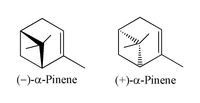- Otto Wallach
-
Otto Wallach 
Born 27 March 1847
Königsberg, PrussiaDied 26 February 1931 (aged 83)
Göttingen, GermanyNationality Prussia / German Empire Fields Organic chemistry Institutions University of Göttingen,
University of BonnAlma mater University of Göttingen Doctoral advisor August Wilhelm von Hofmann,
Friedrich Wöhler,
Friedrich KekuléDoctoral students Walter Haworth Known for Isoprene rule Notable awards Nobel Prize for Chemistry (1910) Otto Wallach (27 March 1847 - 26 February 1931) was a German chemist and recipient of the 1910 Nobel prize in Chemistry for his work on alicyclic compounds.[1][2]
Contents
Biography
Wallach was born in Königsberg, the son of a Prussian official. His father descended from a Jewish family that had converted to Lutheranism. His mother was an ethnic German of Protestant religion. Wallach's father was transferred to Stettin (Szczecin) and later to Potsdam. Otto Wallach went to school, a Gymnasium, in Potsdam, where he learned about literature and the history of art, two subjects he was interested his whole life. At this time he also started private chemical experiments at the house of his parents.
In 1867 he started studying chemistry at the University of Göttingen, where at this time Friedrich Wöhler was head of organic chemistry. After one semester at the University of Berlin with August Wilhelm von Hofmann, Wallach received his Doctoral degree from the University of Göttingen in 1869, and worked as a Professor in the University of Bonn (1870–89) and the University of Göttingen (1889–1915). Wallach died at Göttingen.
Major works
During his work with Friedrich Kekulé in Bonn he started a systematic analysis of the terpenes present in essential oils. Up to this time only a few had been isolated in pure form, and structural information was sparse. Melting point comparison and the measurement of mixtures was one of the methods to confirm identical substances. For this method the mostly liquid terpenes had to be transformed into crystalline compounds. With stepwise derivatisation, especially additions to the double bond present in some of the terpenes, he achieved the goal of obtaining crystalline compounds. The investigation of the rearrangement reactions of cyclic unsaturated terpenes made it possible to obtain the structure of an unknown terpene by following the rearangments to a known structure of a terpene. With these principal methods he opened the path to systematic research on terpenes.
He was responsible for naming terpene and pinene, and for undertaking the first systematic study of pinene^ .
He wrote a book about the chemistry of terpenes, "Terpene und Campher" (1909).
Otto Wallach is known for Wallach's rule, Wallach degradation, the Leuckart-Wallach reaction and the Wallach rearrangement.
References
- ^ Leopold Ruzicka (1932). "Third Pedler lecture. The life and work of Otto Wallach". J. Chem. Soc.: 1582. doi:10.1039/JR9320001582.
- ^ Christmann, M. (2010), Otto Wallach: Founder of Terpene Chemistry and Nobel Laureate 1910. Angewandte Chemie International Edition, 49: 9580–9586. doi:10.1002/anie.201003155
External links
- Nobel Lecture Alicyclic Compounds from Nobelprize.org website
- Biography Biography from Nobelprize.org website
- Otto Wallach at the NNDB website.
Nobel Laureates in Chemistry (1901–1925) - Jacobus van 't Hoff (1901)
- Emil Fischer (1902)
- Svante Arrhenius (1903)
- William Ramsay (1904)
- Adolf von Baeyer (1905)
- Henri Moissan (1906)
- Eduard Buchner (1907)
- Ernest Rutherford (1908)
- Wilhelm Ostwald (1909)
- Otto Wallach (1910)
- Marie Curie (1911)
- Victor Grignard / Paul Sabatier (1912)
- Alfred Werner (1913)
- Theodore Richards (1914)
- Richard Willstätter (1915)
- Fritz Haber (1918)
- Walther Nernst (1920)
- Frederick Soddy (1921)
- Francis Aston (1922)
- Fritz Pregl (1923)
- Richard Zsigmondy (1925)
- Complete list
- (1901–1925)
- (1926–1950)
- (1951–1975)
- (1976–2000)
- (2001–2025)
Categories:- German chemists
- University of Göttingen alumni
- University of Göttingen faculty
- Nobel laureates in Chemistry
- German Nobel laureates
- German people of Jewish descent
- University of Bonn faculty
- 1847 births
- 1931 deaths
- Humboldt University of Berlin alumni
- People from Königsberg
- People from the Province of Prussia
Wikimedia Foundation. 2010.

